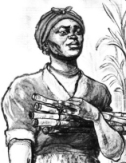Marching on to a Better Land

“La, me, child! I never thought anybody would care enough for me to tell of my trials and sorrows in this world!” That was Charlotte Brooks’ response when she heard that her friend, Octavia, planned to write the story of Aunt Charlotte’s life for publication.
Both Charlotte and Octavia were born in slavery. Octavia was a young child when emancipation came, and she was fortunate enough to have received an excellent university education. She met her husband at the school in Georgia where they both taught. When he finished his schooling and received his D.D., they married. Octavia left her teaching position and settled in Louisiana as a pastor’s wife.
But she never quit teaching. Octavia opened her home to former slaves who never had the opportunity to learn to read and write. She taught them, but she also listened to them. She was amazed by the stories she heard, the testimonies of God’s faithfulness and what these illiterate saints had learned through suffering.
But who would tell their story? Many of these men and women had been separated from their families while still slaves. There was no one to carry on an oral tradition. Octavia felt the weight of her responsibility keenly. She was the repository. She was the only one in her generation who knew how God sustained them through unimaginable hardships. She would write their history.
And so Octavia began her interviews. She collected stories from the men and women she met, starting with Aunt Charlotte, who was a daily visitor in Octavia’s home.
Aunt was a term of respect sometimes given to older women in the South, and Aunt Charlotte was old enough to have lived most of her life in slavery. She was born in Virginia, but had been sold three times. Her first master was relatively kind. He allowed his slaves to go to church, and let them rest on Sundays. But when it came to splitting up families to make a profit, he had no compassion. He sold Charlotte when she was a young girl and sent her away from her mother, breaking both their hearts.
Her new owner moved her to Louisiana but only kept her a short time- just long enough for Charlotte to bear his son. He sold both Charlotte and her newborn—his own child—to her final owner.
Life was unimaginably hard in this new plantation. Charlotte worked as a field hand during the day in the sugar cane fields. Her master required her to leave her baby alone in the slave quarters while she worked, allowing her to nurse the baby just enough at lunch time to keep it alive. Charlotte would bear several children over the next years, but none of them lived past their second birthday. They all died of this forced neglect. “I was glad the Lord took them,” Charlotte told Octavia, with tears in her eyes, “for I knowed they were better off with my Jesus than with me.”
Charlotte met Jesus through the testimony and teaching of another slave, Aunt Jane. Jane was one of the few slaves who could read, and loved to read from the Bible to the others. She taught them about the Hebrew children in Egypt, and how their faithful God saw their suffering and gave them freedom. She also taught them what God said about sin and about faith, and soon a small group of believers began meeting secretly in the slave quarters. The master of the plantation believed that black men and women were without souls, and he hated to hear them sing and pray. They continued to meet, though they were punished cruelly if he caught them.
Charlotte described this time: “O, the day I was converted! It seemed to me it was a paradise here below! It looked like I wanted nothing any more. Jesus was so sweet to my soul.” Jesus would sustain her through many more years of hard labor and unfair treatment.
When emancipation finally came, Charlotte left the plantation alone. Her health was broken and her eyesight poor. She had no surviving family to go with her, only her sweet Jesus. She arrived in the next town with just the clothes on her back and spent her remaining years in abject poverty. But Octavia noticed she always rejoiced in the love of God. “My Heavenly Father took care of me in slave time,” she said, “He led me all the way along, and now He has set me free, and I am free in both body and soul.” She went on to explain, “[I] tells my Father all about my trials here below. We are all free, but we can’t stop praying; we must keep on; we aint out of Egypt yet. We have been let loose, and now we are just marching on to a better land.”
Quotes for this article came from the book, The House of Bondage by Octavia Roberts Albert, Oxford Press New York, 1988.

